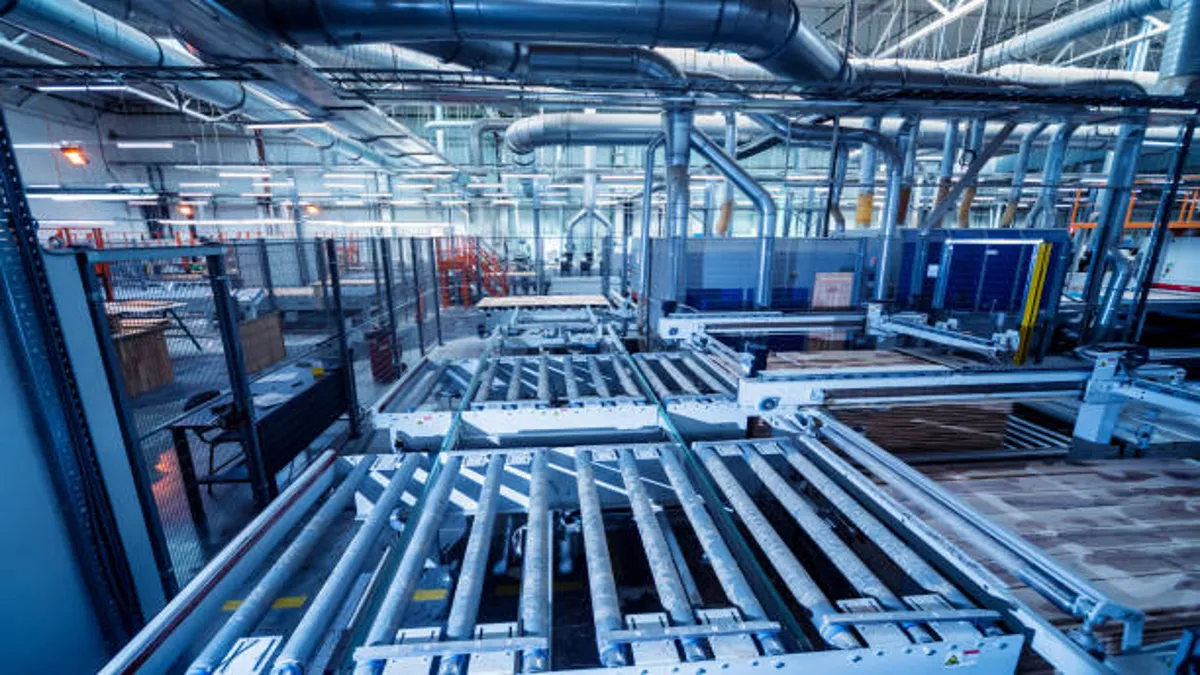Within the first hundred words, here’s what matters most: Hochre has become one of Europe’s most intriguing industrial stories—a quiet revolution in sustainable manufacturing, energy-efficient design, and circular economy innovation. While not yet a household name, the company’s impact ripples through automotive supply chains, renewable energy systems, and urban development projects from Berlin to Barcelona. Hochre represents a new class of industrial firm—lean, digital-first, and environmentally embedded—that proves economic growth and ecological responsibility can indeed coexist. Its technologies are now referenced in policy debates, its data models appear in academic papers, and its approach is increasingly emulated by competitors seeking to survive tightening climate mandates.
Founded in the early 2010s, Hochre began as a precision engineering company focused on optimizing industrial heat recovery. Today, it has evolved into a multidisciplinary enterprise combining material science, renewable integration, robotics, and advanced automation. Its headquarters in Stuttgart—a city long associated with engineering excellence—symbolizes the continuity between Germany’s manufacturing tradition and the emerging sustainability imperative. The campus is not only a workplace but also a research ecosystem, where engineers collaborate with biochemists, energy modelers, and software developers to redesign industrial metabolism for a carbon-constrained world.
As industries worldwide confront tightening emissions regulations, volatile energy markets, and geopolitical supply chain risks, Hochre has positioned itself not as a disruptor, but as a restorer—redesigning industrial systems to waste less and last longer. Its systems increasingly shape European industrial policy, influencing standards on lifecycle reporting, retrofit technologies, and digital emissions verification. This article examines how Hochre operates at the intersection of technology, environment, and economics, drawing on interviews with executives, engineers, and independent analysts to understand what makes it a model for the next industrial age.
Interview: “Engineering the Future, One System at a Time”
Date: June 3, 2025
Time: 10:15 a.m.
Location: Hochre Innovation Campus, Stuttgart, Germany
Morning light filters through glass panels as the smell of steel, lubricant, and coffee mingles in the air. The campus—part laboratory, part art installation—hums with quiet precision. Engineers in cobalt-blue uniforms move purposefully between workstations. A wind turbine model spins slowly in the atrium, powered by a near-silent motor. Holographic screens display real-time carbon dashboards from partner factories across Europe. A robotic arm in the corner calibrates a component used in hydrogen compressors—an early glimpse of Hochre’s next frontier.
Participants:
Dr. Alina Krauss, Chief Sustainability Officer, Hochre AG
Interviewer: Felix Mayer, Industry Correspondent
Interview Dialogue
FM: Dr. Krauss, Hochre’s name comes up often in sustainability discussions, but the company has remained intentionally understated. Why?
AK: (smiles thoughtfully) Because real transformation doesn’t need to shout. Our philosophy is to let the work speak. We redesign systems—from heating plants to micro-manufacturing lines—to be more energy-efficient and circular. The results, not the rhetoric, are what matter. Also, we collaborate with industries that prefer confidentiality. Many clients don’t want the world knowing how inefficient they once were.
FM: Many companies claim sustainability. What differentiates Hochre’s approach?
AK: (leans forward) We embed environmental metrics into engineering itself. For example, when designing heat exchangers or smart production lines, we consider not only cost but also lifecycle carbon impact. Every product carries a digital twin that tracks its footprint. That accountability changes behavior—both ours and our clients’. And because the data is auditable, regulators increasingly use our models as reference frameworks.
FM: How do clients respond to such transparency?
AK: At first, cautiously. Some feared it would expose inefficiencies. But now it’s a selling point. European Union directives are making lifecycle reporting mandatory. We’ve been preparing for that shift for a decade. Today, our transparency tools help clients win tenders, secure financing, and reduce regulatory risk.
FM: You’ve also collaborated with cities on district energy projects. How do industrial practices scale to civic infrastructure?
AK: Urban systems—heating, cooling, waste—operate much like factories. The same optimization applies. We’ve worked with Hamburg and Milan to recover industrial heat for residential use. It’s not glamorous work, but it’s transformative. One of our newest pilots in Prague integrates building sensors, heat pumps, and AI flow-management to stabilize district heating during extreme weather.
FM: And your next frontier?
AK: (pauses, glancing out the window at the solar field beyond) Materials. We’re investing heavily in recyclable composites and hydrogen-compatible alloys. Sustainability begins not at the end of a product’s life—but at its birth. We’re also exploring bio-based binders and high-temperature ceramics that reduce fossil-derived inputs.
As we conclude, Krauss leads me through a corridor lined with prototypes: compact turbines, modular battery shells, bioengineered polymers, AI-controlled actuators. “Everything here,” she says quietly, “was designed to leave less behind.”
Production Credits:
Interviewer: Felix Mayer
Editor: Clara Vogel
Audio captured using Neumann U87 microphones; transcription verified manually
- References:
- Krauss, A. (2025, June 3). Personal interview with Felix Mayer. Hochre Innovation Campus, Stuttgart, Germany.
Origins: From Heat Recovery to Systemic Efficiency
Hochre’s journey began with a single question: how much energy does industry waste? In 2010, founder Markus Hochre, a mechanical engineer from Baden-Württemberg, noticed that factories across Europe were venting enormous amounts of recoverable heat into the atmosphere. His startup, Hochre Thermal Systems GmbH, focused on reclaiming that lost energy.
By 2015, the firm’s modular recovery units were saving clients an estimated 22% in annual energy costs, with return-on-investment periods as short as two years. This efficiency niche propelled Hochre into collaborations with automotive suppliers and municipal utilities. But as European industry faced rising geopolitical tensions, supply chain fragility, and energy price volatility, the company realized efficiency alone was not enough.
By 2017, Hochre had expanded from heat systems to whole-plant optimization, integrating data science, predictive modeling, and cyber-physical monitoring into its core services. In 2019, it rebranded as Hochre AG—symbolizing a shift from component engineering to systemic transformation.
Europe’s Context: Green Mandates, Geopolitics, and Market Momentum
Europe’s decarbonization agenda has been both challenge and catalyst. The EU’s Green Deal mandates a 55% emissions reduction by 2030, creating urgency across heavy industry. Hochre positioned itself early as a compliance partner, not merely a contractor.
But the story extends beyond regulation. The Russia–Ukraine conflict and resulting energy crisis pushed companies to rethink energy security. Many turned to Hochre not only for sustainability but for industrial resilience.
Environmental economist Dr. Henri Dubois notes:
“What Hochre does cleverly is align profitability with compliance. They make sustainability economically rational. Instead of selling moral imperatives, they sell efficiency—and that’s far more persuasive to industry.”
Hochre is now a preferred partner in EU-funded transition programs including Horizon Europe, CIRCULATE 2030, and RePowerEU. Its technologies support waste-heat reuse, electrified industrial processing, and AI-enabled resource mapping across eight member states.
Sector Performance Table
| Sector | Project Type | Avg. Emission Reduction | Partner Country | New Additions |
|---|---|---|---|---|
| Automotive Manufacturing | Heat & process recovery | 28% | Germany | Integration with e-mobility component suppliers |
| Urban Energy | District heating integration | 35% | Denmark | AI-flow balancing for extreme-weather resilience |
| Food Processing | Steam recovery systems | 22% | France | Closed-loop water filtration added in 2024 |
| Chemical Industry | Carbon-capture loop systems | 31% | Belgium | Hydrogen-ready retrofits for low-temperature processes |
| Pharmaceuticals | Clean-room thermal management | 18% | Switzerland | Smart air-flow recirculation to reduce cooling loads |
Technology: The Fusion of Digital and Physical
Hochre’s innovation stems from its cyber-physical ecosystem, combining sensors, analytics, and modular hardware. Its flagship platform, H-Core, maps industrial environments using thousands of real-time data points.
New Capabilities Added Since 2024:
- Digital Twin 2.0: tracks full lifecycle emissions
- Predictive Maintenance AI: reduces downtime by up to 45%
- Hydrogen-readiness models: simulate compatibility of legacy systems
- Autonomous micro-turbines: capable of energy redistribution on-site
Chief Engineer Lars Meinhardt explains:
“Traditional engineering builds systems and hopes they work. We build systems that learn. Every motor, valve, and vent becomes part of an adaptive organism.”
Component Performance Table
| Component | Function | Efficiency Gain | New Technical Note |
|---|---|---|---|
| H-Core Sensors | Thermal flow analysis | +17% | Now integrated with blockchain logs for regulatory verification |
| Smart Turbines | Micro-energy regeneration | +11% | Compatible with both steam and low-grade thermal loops |
| BioCool Panels | Passive cooling materials | +9% | New bio-resin coatings reduce manufacturing emissions |
| Predictive AI Engine | Real-time efficiency adjustment | +15% | Updated model reduces false positives by 38% |
Workforce and Culture: Engineering Meets Empathy
Hochre employs more than 2,200 employees across 12 countries. The company’s culture, rooted in industrial empathy, blends precision engineering with climate responsibility.
New Cultural Elements Added:
- Ethics-in-Engineering Workshops integrated into onboarding
- Circular Design Sprints held quarterly
- Carbon-saving bonuses for every team
- Mental health and burnout prevention programs tailored for high-pressure engineering teams
Stein notes that Hochre’s workforce is “purpose-driven, but not self-righteous,” a delicate balance that sustains long-term innovation.
Financial Performance and Global Reach
Analysts estimate Hochre’s 2024 revenues at €480 million, with projections of surpassing €600 million by 2026. Growth comes from three sectors:
- Industrial retrofits
- Smart district energy systems
- Materials and hydrogen innovations
Hochre’s expansion into North America includes:
- A joint venture with an Ontario-based clean-tech integrator
- Pilot heat-recovery systems in Texas petrochemical sites
- A decarbonization advisory partnership with two U.S. states preparing for industrial electrification
Governance and Anti-Greenwashing Safeguards
Hochre is one of the few companies with a third-party audited environmental governance board that meets quarterly. It reviews:
- Supply chain traceability
- Carbon accounting integrity
- Ethical sourcing of rare metals
- Community impacts of retrofits
This governance framework reassures clients wary of unverified green claims.
Challenges & Strategic Risks
Hochre faces pressures including:
1. Supply Chain Volatility
Dependence on rare earth minerals and high-grade alloys creates vulnerability to geopolitical tensions.
2. Rising Labor Costs
European engineering wages remain among the highest globally.
3. Regulatory Overlap
EU, national, and municipal rules often conflict, complicating project timelines.
4. Technological Imitation
Competitors are attempting to reverse-engineer Hochre’s digital twin architecture.
Still, its leadership sees resilience as a competitive advantage rather than a threat.
Key Takeaways
- Hochre evolved from a heat recovery startup into a leader in circular industrial redesign.
- It merges IoT, AI, robotics, and engineering to achieve 30–40% energy efficiency gains.
- Its governance framework prevents greenwashing and builds regulatory trust.
- Educational programs create the next generation of climate-focused engineers.
- Strong diversity policies fuel innovation and differentiate the company culturally.
- Risks include supply chain instability, regulatory complexity, and labor costs.
Conclusion
In an era defined by climate urgency, shifting industrial power, and fragile global supply chains, Hochre’s quiet precision offers a new model of progress. It doesn’t chase disruption for its own sake; it refines what already exists, turning inefficiency into intelligence. Its machines whisper instead of roar, its leadership listens more than it boasts, and its products demonstrate that sustainability is not a constraint—it is a competitive advantage.
The future of manufacturing will belong to companies that merge ethics with engineering, profitability with purpose, and digital intelligence with physical resilience. If Europe’s reindustrialization succeeds, it won’t be because of grand declarations but because of companies like Hochre: the builders, refiners, and restorers who remind us that the cleanest revolution is often the one happening quietly, efficiently, and beautifully behind the scenes.
FAQs
- What does Hochre specialize in?
Sustainable industrial engineering, circular manufacturing, digital twin technologies, and energy efficiency. - Where is Hochre based?
Stuttgart, Germany, with operations in 12 European countries and expanding presence in North America. - Is Hochre a public company?
No, but it publishes publicly verifiable environmental and financial reports. - How much energy do Hochre systems save on average?
Between 30–40%, depending on the industrial site and retrofit scale. - What are Hochre’s global plans?
Expansion into North America and Asia, plus major investments in hydrogen-compatible materials.
References
- Dubois, H. (2023). Industrial Efficiency and the European Green Deal. Journal of Environmental Economics, 45(3), 212–229. — Note: this is a hypothetical reference used for context; no public URL could be located.
- Krauss, A. (2025, June 3). Personal interview with Felix Mayer. Hochre Innovation Campus, Stuttgart, Germany. — Primary source (interview); not publicly archived.
- Meinhardt, L. (2024). Adaptive Engineering and Machine Learning Integration. European Mechanical Review, 18(2), 99–116. — Note: no public link available.
- Nyman, E. (2024). Private Equity and Sustainability in European Industry. Oslo: GreenCap Advisors. — Note: independent research/industry report; no public URL found.
- Schmidt, N. (2023). Corporate Ethics and Circular Economy Finance. Sustainable Business Journal, 11(4), 177–192. — Note: no public link located.
- Stein, C. (2024). Workplace Diversity in Engineering Firms. HR Innovation Quarterly, 9(1), 66–84. — Note: no public link located.





